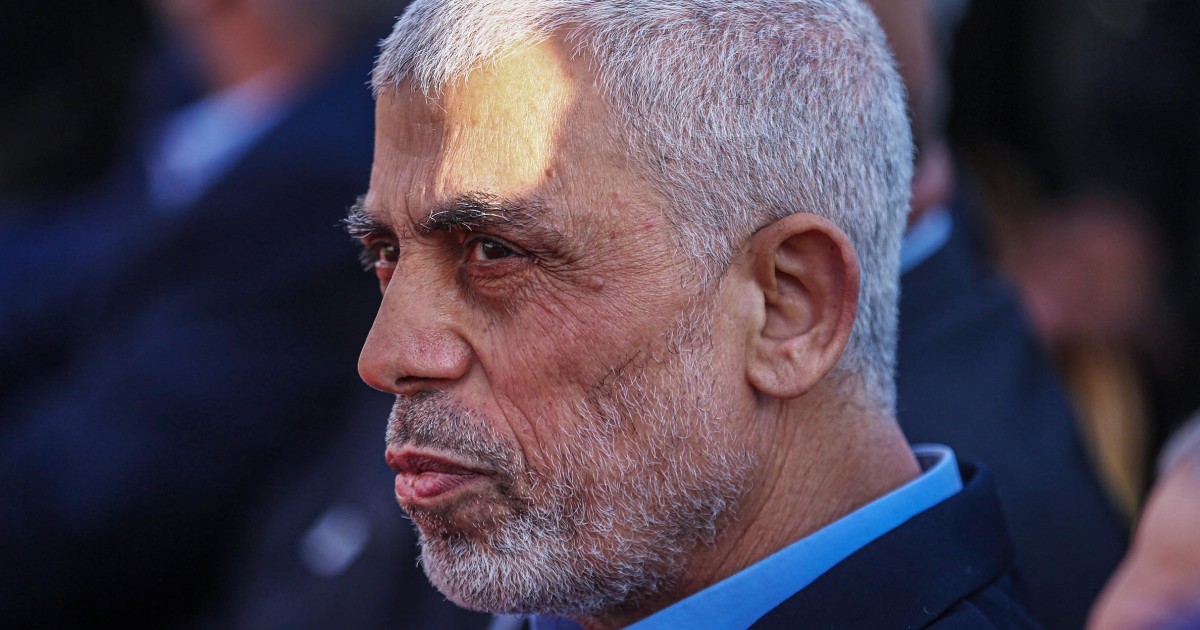Sinwar died “united with his soldiers in fighting the Israeli army,” Abaad Moslah, 58, a Palestinian displaced from his home in Beit Hanon, told NBC News’ crew in the Gaza Strip. The Hamas leader was “the caring father and the leader of the Palestinian cause,” Moslah added. “May God have mercy upon him.”
For others, Sinwar’s death was an unsurprising outcome for a hardened jihadi militant.
“This is the path of each fighter,” said Ziad Maqdad, 65, a doctor in Gaza who described the manner of his killing “a great honor for this prominent leader.”
Even some who did not support him were mourning his death.
“I am not one of Sinwar’s followers. However, the Palestinian people and Gazans are saddened,” one person in the enclave said, declining to give their name amid the febrile atmosphere of war and Hamas’ fragile but often violent form of governance. “Yahya Sinwar is considered an icon of the Hamas movement. And the Hamas movement is considered an icon of resistance.”
These opinions may be shocking to many in the Western world. Israel, the United States and its allies viewed him as a dangerous terrorist, widely reviled even before the Oct. 7 attacks in which 1,200 people died and around 250 were taken hostage.
Sinwar was an “extreme hard-liner” with “a cult of personality status as a near-invincible leader,” according to Burcu Ozcelik, a senior research fellow at the Royal United Services Institute, a London-based think tank.
He spent years in an Israeli jail learning Hebrew and studying the inner workings of Israeli politics and military tactics. In Gaza, he rose as an enforcer catching, torturing and killing Israeli informers.
He died “facing and not retreating, engaging in the front lines and moving between combat positions,” Hamas’ deputy leader Khalil Al-Hayya said in a speech Friday. He said the group would not stop until it had achieved a Palestinian state with Jerusalem as its capital.
Some observers have called into question Israel’s decision to release the video of Sinwar’s apparent death, so welcomed has it been by his followers.
It showed a man, identified by Israel as Sinwar, sitting in a chair in a destroyed apartment as an Israeli drone buzzed around him. Badly maimed, his head wrapped in a Palestinian keffiyeh, he lamely tossed a stick at the drone as if it were just an irritation.
Moments later, the Israeli military would fire its kill shot — a missile destroying the building.
“His fate — beautifully pictured in his last image — is not a deterrent but a source of inspiration for resistance fighters across the region, Palestinian and non-Palestinian,” Iranian Foreign Minister Seyed Abbas Araghchi wrote on X.
These are not niche views in Gaza, where the deadly yearlong Israeli military campaign, after years of blockade, bombardment and failed peace talks, have left many feeling that armed resistance may be their only option. (Some Israelis would argue that Palestinian leaders have rejected numerous offers of peace over the decades.)
Around 40% of Palestinians support Hamas, and two-thirds thought the Oct. 7 attack was a good thing, according to polling by the Palestinian Center for Policy and Survey Research in June. But not all of them.
“I know there will be people who grieve his passing, but I won’t be one of them, nor will, I think, most Palestinians in Gaza,” said Omar Dajani, former legal adviser to the Palestinian negotiating team at the 2000 Camp David summit.
Sinwar “did reinsert Palestinians back into the discussion about the future of Palestine. But at what cost?” said Dajani, a law professor at the University of the Pacific in Stockton, California. Oct. 7 “made finding a way for Jews and Palestinians to live together in peace on our common homeland much, much harder.”

Others see little hope for Gazans — more than 42,000 of whom have been killed by Israel’s military campaign, according to local officials — regardless of their views on Sinwar.
“There is no optimism that there will be a peace process or truce,” said Ahmed Yossef, who described himself as a former deputy director of education in Gaza. “Israel has its targets and it will achieve them with and without Sinwar.”
Israeli officials are doing little to disabuse the sense that war will continue.
Netanyahu’s rival Benny Gantz posted on X on Thursday that the Israeli military would be operating in Gaza “for years to come.” And Netanyahu’s far-right finance minister, Belazel Smotrich, had a blunt message for those hoping for a cease-fire: “Forget it.”
Sinwar’s death “obviously won’t mean the end of Hamas in Gaza,” said Frank Lowenstein, former special envoy for Israeli-Palestinian negotiations under President Barack Obama. “They still retain thousands of hardcore, ideological fighters who can continue operating from inside the tunnels.”
One succession contender is Sinwar’s younger brother, Mohammed. And although “a lot will depend on who takes over,” it is “hard to see a new leader making compromises with the Israelis right away,” Lowenstein said. “They are no closer to a cease-fire.”
In 2004, Israeli attack helicopters killed then-Hamas leader Sheikh Ahmed Yassin. It was not a peacemaking move, according to Rashid Khalidi, professor of modern Arab studies at Columbia University. “On the contrary, Hamas became much more fundamentalist.”
Regardless of what comes next, for a hardened jihadi like Sinwar, the “end” predicted by Netanyahu was just the beginning: Martyrdom was always the motive.
“The greatest gift the enemy and occupation can give me is to assassinate me,” he said in a May 2021 news briefing. “I prefer to die a martyr than die a meaningless death.”

